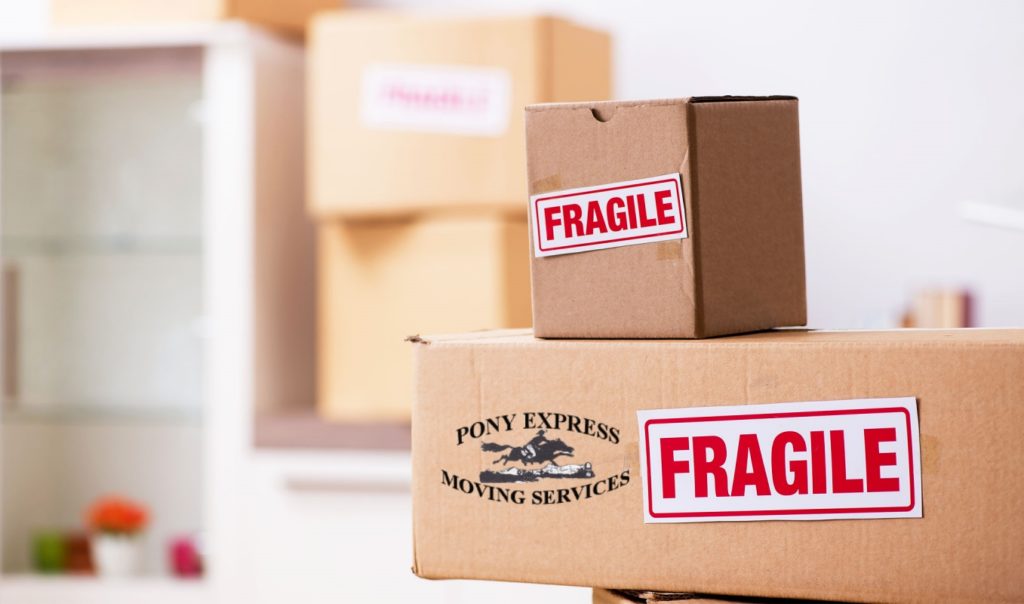If you’re in a rush to move, you can probably get away with throwing most of your belongings into a box without too much concern. However, chances are you want to protect your fragile items like your favorite mug, plates, or flat-screen TV. In order to ensure their safety during your Boston move, you should take the time to properly pack fragile items so that they are secure. It will mean you have to put in extra effort and attention into packing them correctly, but it will be well worth it when all of your items arrive intact.
Gather Materials for Fragile Items
Before you start packing, you first need to get the appropriate materials. To prevent damaging fragile items, you need to provide some cushioning during transport. Boston streets tend to be quite bumpy, so if you don’t properly protect your glassware, they can easily shatter even if you just move a few blocks away. If you don’t already have some on hand, you should get the following items:
- Moving boxes of different sizes
- Bubble wrap
- Packing paper or newspaper
- Markers
- Tape and scissors
- Dividers
- Towels or socks for cushioning
You can find many of these items for cheap or even free if you know where to look. For boxes, you can ask family, friends, or even a local store if they have any that they plan on throwing out. As well, you can go to sites like freecycle , craigslist or Facebook marketplace and see if there are any listings for the supplies you need. If you work in an office, you might be able to ask the mailroom if you can take any extra supplies they might have.
Pack Your Fragile Items
Once you have everything in one place, it’s time to get packing. Your first step starts with choosing a proper box. You should opt for smaller boxes for your fragile items so you don’t over-pack. Not only are smaller boxes easier to handle, they are less likely to allow items to shift inside during the move. With that said, make sure the small box is also very sturdy as you don’t want it breaking down during the move!
Once you have the perfect boxes, you should secure the bottom and sides with extra tape. This will add extra support and keep it from bowing under the weight of its content. After that, add packing paper, bubble wrap, packing peanuts, or even towels to cushion the bottom of the box. Now that you have your box prepared, it’s time to start packing your fragile items!
There are several steps you can take to reduce the chances of your items breaking. Whether you’re packing your plates or glassware, you should take the time to wrap each individual piece. More delicate items like china should be wrapped in bubble wrap and then secured with tape. Other items that are a bit sturdier can be wrapped in packing paper or even things like face and/or hand towels.
Once everything is wrapped up, layer all of the items from largest to smallest. This way, the base of the box will be well-supported and your smaller items won’t get crushed. If you’re packing glasses and stemware don’t stack them. Instead, separate them with cardboard dividers to keep each item from colliding during the move. You should also fill glassware and other hollow items with packing paper to soften any vibrations.
After everything is in boxes, fill the empty space with packing peanuts, towels, or paper to further prevent these items from moving around. Don’t forget to add a layer to the top before you seal up the box!
Label Your Boxes
Regardless of whether you’re hiring professional Boston movers or not, you should always label the boxes with your fragile items so that you know to handle it with care. Make sure to also include an arrow on the side of the boxes telling them which side is up so they’re not carrying your boxes out upside down! Reliable movers in Boston will generally load fragile items last and will pack them near the top of the pile to prevent any items from accidentally getting crushed. If you have smaller trinkets or maybe a mug you really like, you should carry them with you separately. That way you won’t lose or ruin it during a trip.
If you are putting your items in storage for a while, you should take the time to create a content list on each box. Chances are you likely won’t remember what is in each box after a few months, so just writing fragile or glassware won’t really help. Plus, writing everything out will help you keep track of your items after the move and can help you unpack once you’re in your new place.
Handling Broken Items
Even the best laid plans can often go awry. Even if you did everything right, something still might break during the move. If that happens, you should be very careful when unpacking the items. Remember, handling broken glass or ceramic items is dangerous so be cautious. If you are moving with roommates or family, inform them of what happened and then remove the large pieces first. After that, carefully remove the other unbroken items and carefully wipe it down to remove smaller pieces. You should also vacuum around the box to clean up any small particles that might have fallen to the ground.
If you hired Boston movers, you should be able to file an insurance claim if you can prove that the fragile items were in one piece and properly packed. Most moving companies provide basic insurance that will reimburse you $0.60/pound for each damaged item. Some companies will go the extra mile and might even reimburse you more depending on the cost of the item. If you have a lot of expensive and fragile items, it might make sense to pay the extra money for full moving insurance. This way you can get a full reimbursement for your damaged items.
Conclusion
Packing might be tedious, but if you want to give your delicate items the best chance of making it through a move, it pays to take your time and do it right. Of course, if you don’t have the time to do the packing yourself, you can always hire a full-service moving company that will do all the packing for you. Just make sure to let them know what items need to be treated with care, especially if it’s not obvious!
FAQ
Are there alternative wrapping materials I can use instead of packaging paper?
If you have a tight budget, any cost-savings can be a godsend. Instead of buying packaging paper you can use clothes, towels, sheets, and other fabrics. Just make sure everything is washed and cleaned. If something breaks, during the move, make sure the items you use are properly vacuumed and cleaned of any stray glass/ceramic.
I don’t want to use bubble wrap for moving. What else can I use?
Bubble wrap is great for protecting your fragile items, but after you move chances are you’ll end up tossing it in the trash. If you’re concerned about the environment, this might be the last thing you want to do. Instead, there are more eco-friendly options such as biodegradable packing peanuts, seaweed packaging, air pillow, corrugated packaging, and more.
What items should be considered fragile?
Glassware and dishware are the obvious choices, but other fragile items include: lamps, pictures/frames, TVs, antiques/specialty items, tiles, collectibles, and more. Basically, it includes anything you really don’t want damaged!


